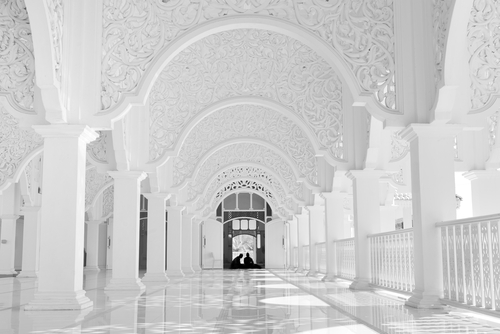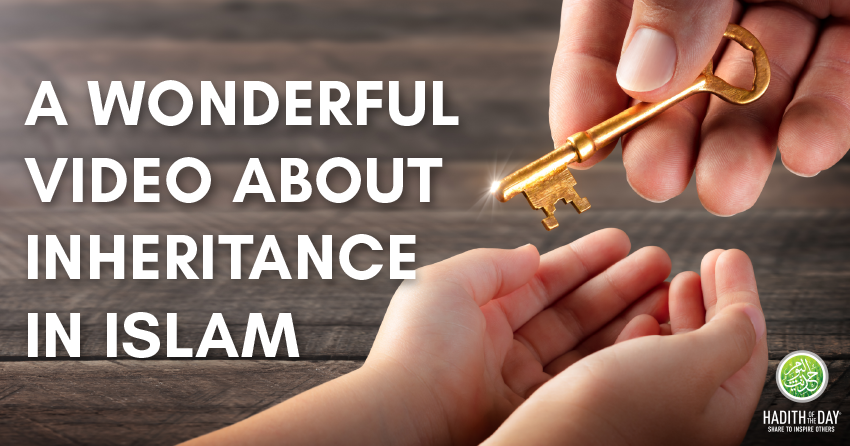Prophet Shu’ayb (AS)

And to Madyan [We sent] their brother Shu’ayb. (Qur’an 7:85, 11:84, 29:36)
Just when Shu’ayb AS lived is not clearly known. What is know with certainty is that he was sent to the people of Midian, area in the northwestern part of the Arabian peninsula which extended from the present-day Gulf of Aqaba west into the Sinai peninsula and to the mountains of Moab east of the Dead Sea. Its inhabitants were Arabs of the Amorite group of tribes.
The Midianites lived at the crossroads of the great trade route extending from Yemen to Hijaz and northward to Syria, and from Egypt to Iraq.
Shu’ayb’s AS people are referred to in the Qur’an both as Midianites (Madyan) (7:85, 11:84, 22:44, 29:36) and as dwellers in the thorn bush or companions of the wood, as-hab al-aykah (15:78, 26:17. 38:13, 40:14). According to some commentators, the aykah means a thick forest; others say it means “thorny bush,” referring to a kind of twisted or twining tree, which grew in the area. Al-Aykah is also said to have been the name of the capital city of Shu’ayb’s AS people, located at the site of Tabuk in what is now Saudi Arabia.
Ibn Kathir’s narrations inform us that the first and primary sin of Shu’ayb’s AS people was that they ascribed divinity to false gods. Another was that they habitually cheated in trade, giving short measure and weight but taking ore than their due, in spite of the fact that Allah had given them good provision and made their lives easy. And their third major sin was the practice of highway robbery.
Since the territory of Shu’ayb’s AS people lay on a major trade route, one branch of which connected Yemen with Syria and the other Egypt with the Persian Gulf, they were in a prime position to prey on passing caravans. Indeed, it is said that would not let any caravan pass until it had paid a stiff ransom. Ibn Abbas RA reports that they originated the crime of sitting by the roadside and forcibly extracting a payment for its use, while the early commentator Al-Suddi says that they used to take one-tenth of the property of passers-by by force. And although we have no clear information concerning this, it may that they applied to the extreme of “Your money or your life.”
Who was Shu’ayb AS? We cannot say with certainty. While Prophet Muhammad SAW mentioned him as being among the four Arabian prophets, we do not have clear information about his identity or the time when he lived. However, his words,
And O my people, let not [your] dissension from me cause you to be struck by that similar to what struck the people of Noah or the people of Hud or the people of Saleh. And the people of Lot are not from you far away. (Qur’an 11:89)
make it clear that Shu’ayb AS lived after the time of Lut AS.
Shu’ayb’s AS people are mentioned seven times in the Qur’an as “Madyan” and four times as “the dwellers in the thorn bush” (or “companions of the wood”), while Shu’ayb AS himself is mentioned eleven times. It is said that he was either weak of vision or blind. And he was granted a special favour – namely, such eloquence in speech and argument that thousands of years later Prophet Muhammad SAW said about him,
“And that was the speaker of the prophets (khatib al-anbiya)”. (Ibn Kathir)
SHU’AYB AS CALLS TO HIS PEOPLE
Like the earlier prophets, Shu’ayb began his mission by calling his people to their Lord.
“O my people, worship Allah,” he said, you have no deity other than Him (Qur’an 7:85, 11:84, 29:36) and expect the Last Day and do not commit abuse on the earth, spreading corruption.” (Qur’an 29:36)
Thus was initiated a series of dialogues that took place between Shu’ayb AS and his people over an unspecified period of time. As was the case of the earlier prophets, Shu’ayb’s AS preaching was met with hostility and rejection, and once again there began a conflict of escalating intensity between the forces of falsehood and the representative of the Lord of truth.
After addressing his people’s first and gravest sin, idolatry, Shu’ayb AS spoke to them about their sins in relation to their fellow men. Among these were their dishonest and deceitful trade practices their corrupting the land by highway robbery, and other evil actions. Shu’ayb’s AS preaching and his people’s responses are reported in three passages of the Quran.
When Shu’ayb said to them, “Will you not fear Allah? Indeed, I am to you a trustworthy messenger. So fear Allah and obey me. And I do not ask you for it any payment. My payment is only from the Lord of the worlds. (Qur’an 26:177-180)
He urged his people,
“Give full measure and do not be of those who cause loss. And weigh with an even balance. And do not deprive people of their due and do not commit abuse on earth, spreading corruption. And fear He who created you and the former creation.” (Qur’an 26:181-184)
But, unwilling to acknowledge the truth of their prophet’s message or to change their way of life and evil habits, his people put forth a number of excuses for not believing him.
“You are only of those affected by magic,” they charged. “You are but a man like ourselves, and indeed, we think you are among the liars.”
Then like the people of other prophets before them, they threw out an impertinent challenge:
“So cause to fall upon us fragments of the sky, if you should be of the truthful.”
(Qur’an 26:187)
“My Lord is most knowing of what you do,” Shu’ayb AS replied. (Qur’an 26:188)
It was not for him to compel them to believe and accept guidance, nor to punish them for not doing so, for the decreeing and arrangement of matters lay with Allah alone, and he rest his case with Him.
Shu’ayb AS also appealed to his people to give up their other very serious sin, the practice of highway robbery. He attempted to make them acknowledge Allah’s favours and bounties to them as people. He reminded them of the divine retribution that had come upon the people who preceded them, whose stories they knew only too well.
(Qur’an 7:86)
But while Shu’ayb’s AS preaching and warning merely inflamed the enmity of the hardened deniers of truth, among those who listened to him, some nevertheless recognised the validity of his message and accepted faith, as is clear from his words,
“And if there should be a group among you who has believed in that with which I have been sent and a group that has not believed, then be patient until Allah judges between us. And He is the best of judges.” (Qur’an 7:87)
The arrogant ones threatened to drive the prophet out of their community unless he followed their idol-worshipping ways. Shu’ayb AS tried to make clear to the unbelievers that he did nothing by his own will, for his will was totally under the command of the One who had appointed him as their prophet.
(Qur’an 7:88-89)
But the unbelievers would have none of this. Even though they recognised the truth of what their prophet was saying to them, their pride, stubbornness and love of the life to which they were accustomed would not let them admit it.
Shu’ayb AS repeated the same condemnation of this people’s evil practices and warned them that while they may now be well off (perhaps as a result of cheating people), they must not forget that the Day of Accounting would come, a day on which they could not possibly escape.
He advised them to give due rights to people in trade, to be honest and to not act wickedly.
(Qur’an 11:84-86)
As their prophet continued to preach and warn, the unbelievers continued to wickedly turn his faith and his words against him. Shu’ayb AS replied to each mocking statement earnestly, with deep concern for them, stating his good intention to reform them only as much as he was able to and that his success was completely through Allah.
He reminded them of the people of Nuh AS and Lut AS.
“And O my people, let not [your] dissension from me cause you to be struck by that similar to what struck the people of Noah or the people of Hud or the people of Saleh. And the people of Lot are not from you far away.” (Qur’an 11:89)
Assuring them of Allah’s readiness to accept repentance and His boundless forgiveness, he added,
“And ask forgiveness of your Lord and then repent to Him. Indeed, my Lord is Merciful and Affectionate.” (Qur’an 11:90)
His people flung back at him, hurling insults at him.
Then, at last, with unshakeable trust in Allah, his Protector, he threw out a bold challenge to the unbelievers:
“And O my people, work according to your position; indeed, I am working. You are going to know to whom will come a punishment that will disgrace him and who is a liar. So watch; indeed, I am with you a watcher, [awaiting the outcome].” (Qur’an 11:93)
THE PUNISHMENT
When the enmity of the unbelievers toward their prophet had increased beyond all bounds, Allah’s decree went forth against them. With terrible, stunning swiftness, the divine retribution fell.
What was the retribution? Allah most High describes in powerful image-invoking language.
And they denied him, so the punishment of the day of the black cloud seized them. Indeed, it was the punishment of a terrible day. Indeed in that is a sign, but most of them were not to be believers. And indeed, your Lord – He is the Exalted in Might, the Merciful. (Qur’an 26:189-191)
So the earthquake seized them, and they became within their home [corpses] fallen prone. Those who denied Shu’ayb – it was as though they had never resided there. Those who denied Shu’ayb – it was they who were the losers. (Qur’an 7:91-92)
And when Our command came, We saved Shu’ayb and those who believed with him, by mercy from Us. And the shriek seized those who had wronged, and they became within their homes [corpses] fallen prone. As if they had never prospered therein. Then, away with Madyan as Thamud was taken away. (Qur’an 11:94-95)
Ibn Kathir states that the people of the thorn bush were destroyed by a variety of interrelated punishments. His comment on (26:189) suggests that they were visited by a heat wave which lasted for seven days. Neither water nor shade nor going underground helped them, and they ran from their houses toward the desert. There a cloud overshadowed them and they gathered beneath it. Allah then sent upon them fire and flaming missiles of stone. The earth quaked beneath them, while a thunderous roar came from the sky.
From these accounts, we may speculate that they “overcast” may have been the sort of darkness that often occurs simultaneously with volcanic eruptions and earthquakes, or it may have been a dense cloud of volcanic ash prior to an eruption. Whatever it was, the Midianites were obliterated as a single body, like the communities of unbelievers before them.
But the punishment did not come near Shu’ayb AS and the believers. And Shu’ayb AS turned away from the remains of his community saying,
“O my people, I had certainly conveyed to you the messages of my Lord and advised you, so how could I grieve for a disbelieving people?” (Qur’an 7:93)
It is reported that Shu’ayb AS and his followers died in Mecca. Ibn Kathir mentions the exact location of their graves on the west side of the Kaabah.
May Allah’s peace and blessings be upon Prophet Shu’ayb AS.
TRACES OF THE PEOPLE OF SHU’AYB AS
Whether the Midianites and the people of the thorn bush were a single or two groups of people, they were eliminated without a trace.
Like the territory of Thamud, the nearby region of Midian is characterized by unmistakable evidence of volcanic eruptions and earthquakes.
REFLECTION
The story of Shu’ayb AS is the last of the stories of the five warner-prophets whose entire communities were destroyed by catastrophic divine punishments, the others being Nuh, Hud, Saleh, and Lut, may Allah’s peace and blessings be upon them all.
Centuries after the last of these prophets had come and gone, Allah revealed to His Last Prophet, Muhammad SAW:
Those cities – We relate to you, [O Muhammad], some of their news. And certainly did their messengers come to them with clear proofs, but they were not to believe in that which they had denied before. Thus does Allah seal over the hearts of the disbelievers. (Qur’an 7:101)
By denying the truth and defending, cherishing and living by falsehood, the disbelievers sealed their fate and finally died for it, for ultimately, when their hearts remained closed and their response remained unchanged, Allah’s response to them was to decree their destruction.
Afterwards, new generations arose that perhaps benefitted temporarily from the lessons of the past. But little by little these lessons were forgotten and the downward spiral of civilisation again began and gathered momentum. New prophets were then sent, were similarly rejected, and their people destroyed in like manner.
Perhaps in our time we may feel safe and confident in assuming that all that is a thing of the past and that no punishment will ever come upon people or societies in our time. But if we permit ourselves such faulty reasoning, we are not only turning our backs on what the collective history of mankind has to teach us, but also failing to understand one of the most important lessons: that actions have consequences, both for individuals and their societies, which must sooner or later be felt.
Sometimes the consequences of our actions are deferred for the Hereafter, but at other times, when Allah wills, they may be experiences during this life. The message of all the warner-prophets’ stories is that when people are admonished and advised by the sources of faith they acknowledge yet consistently refuse to accept truth and turn away from divine guidance for reasons of self-interest, Allah’s punishment may fall upon them collectively during this life in advance of their individual punishment in the Hereafter.
Because His Will is ever above all wills, the reality is that, regardless of the extent and duration of wrongdoing, it can continue only up to the limit that He permits. Therefore, as is demonstrated by these stories, when Allah, who is endlessly patient and forbearing, sends His warnings to a people and they repeatedly disregard and reject them, terrible consequences can be expected. And unfortunately, as so many events in the past and in our own time have shown, these consequences do not come only upon the guilty members of a society but affect everyone in it.
As long as revealed scriptures remain among us, the eternal, unchanging message of the prophets still speaks to our hearts. We do not have the excuse of claiming that no warner or guide came to us to show us the way, for the true histories of Allah’s messengers have been preserved in the Holy Qur’an, which remains word for word, letter for letter, exactly as it was revealed through archangel Jibrael AS to the Last Prophet Muhammad SAW over fourteen hundred years ago.
We live in an extremely difficult time, a time in which unprecedented evils flourish upon the earth. These evils, one following the other, leave their mark upon the planet, upon our hearts and minds and bodies and societies. None of us is exempt from their effects.
As long as they continue, we must consider ourselves vulnerable to Allah’s judgement. Today, the earth gives us the strongest possible signals, in the form of frequent violent natural disasters, that the injustices carried out upon its surface, in its atmosphere, and even in the depths of its seas, has produced disturbance in its equilibrium. As Allah says in the Qur’an:
Corruption has appeared throughout the land and sea by [reason of] what the hands of people have earned so He may let them taste part of [the consequence of] what they have done that perhaps they will return [to righteousness]. (Qur’an 30:41)
Today, as in the time of the prophets and through their tongues, Allah most High, calls us to return to Him. And safety lies in keeping firmly to the path of faith and goodness, and the path of His messengers and their righteous inheritors and followers – all those who keep Him in their hearts and live by His guidance.
“Our Lord, You did not create this aimlessly; exalted are You [above such a thing]; then protect us from the punishment of the Fire. Our Lord, indeed whoever You admit to the Fire – You have disgraced him, and for the wrongdoers there are no helpers. Our Lord, indeed we have heard a caller calling to faith, [saying], ‘Believe in your Lord,’ and we have believed. Our Lord, so forgive us our sins and remove from us our misdeeds and cause us to die with the righteous. Our Lord, and grant us what You promised us through Your messengers and do not disgrace us on the Day of Resurrection. Indeed, You do not fail in [Your] promise.” (Qur’an 3:191-194)
Acknowledgement:
“A History of the Prophets of Islam”, Volume I, by Suzanne Haneef
NEXT: PROPHET MUSA (AS)
Since You’re Here… we have a small favour to ask.
In these extraordinary times, millions rely on HOTD for daily uplifting & inspiring content. Established since 2009 and with your kind support we’ve seen readers elevate their Imaan & strive for better on a daily basis. We’re committed to keeping our content freely available and open for all readers. Every contribution, however big or small, makes a difference and help us spread knowledge to millions daily
HOTD is something special, it’s a place where people can come to be inspired, to renew their faith, to learn and share knowledge, to fall in love with our faith and also our Prophet (peace and blessings be upon him and his family).
All content on HOTD is free. We believe what we do in this life builds for the next one and we work tirelessly with the aim to please Allah and inspire the global Muslim community as
well as providing information and inspiration for anyone interested in Islam. We simply cannot do this without your support and your support helps us continue our services.
If there were ever a time to join us, it is now. You can support HOTD and help sustain our future. Support Hadith of the Day and make a one-off donation or give regularly from as little as £10 a month Jazak’Allah Khayr – whatever you donate will come back to benefit you Insha’Allah as whatever is spent in the way of Allah is an investment in the future and the next life. Thank you.







